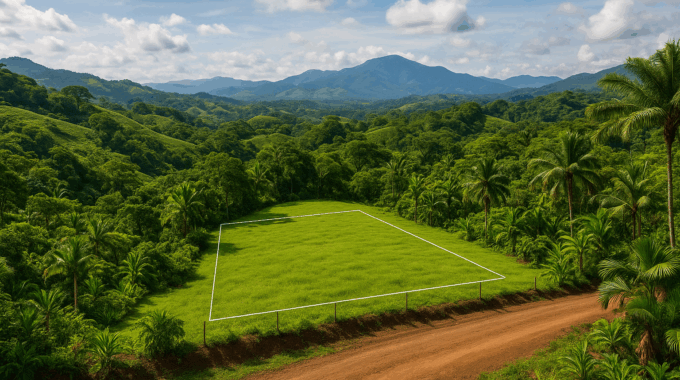"Property Renovations? Fund It With an Equity Loan from GAP Equity Loans. Borrow $50,000 to $1,000,000 with interest rates starting at 12% and flexible loan terms."

Financing Options for Costa Rica Real Estate: Competitive Rates
Dreaming of owning a slice of paradise in Costa Rica? With its stunning natural beauty and stable economy, Costa Rica continues to attract a growing number of foreign buyers. According to recent reports, foreign investment in Costa Rican real estate increased by over 20 percent in the past year alone.
We connect borrowers with private investors and lenders, providing competitive rates, lower fees, and flexible financing options compared to traditional banks. Our goal is to simplify the process, helping hardworking individuals secure the financing needed to achieve their investment property goals without unnecessary hurdles.
Understanding the various financing options available is crucial for making informed decisions. We’ll explore the different solutions, focusing on those that offer competitive rates and flexible terms for foreign investors.
The Costa Rica Real Estate Market Overview
The allure of Costa Rica’s real estate lies in its unique blend of natural beauty, political stability, and economic growth. As a result, many foreign buyers have found investing in Costa Rica real estate to be a smart and rewarding decision.
Why Costa Rica Continues to Attract Foreign Investors
Costa Rica’s real estate market continues to attract foreign investors due to its remarkable stability and growth potential. Properties in sought-after locations like Guanacaste, San José, and coastal towns along the Pacific have appreciated by 8 to 15 percent annually.
- Political stability and strong property rights for foreigners
- Diversity of available properties, including beachfront condos and luxury homes
- Robust legal protections for foreign buyers
Current Market Trends and Property Values
Current market trends show increasing demand for properties with rental potential, particularly in tourist hotspots. Property values in Costa Rica offer competitive returns compared to other international markets.
- Increasing demand for properties with rental potential
- Competitive returns on investment
- Lower property taxes and maintenance costs
Challenges of Financing Real Estate in Costa Rica
Securing financing for Costa Rican real estate is fraught with challenges, particularly for non-residents. Foreigners can legally own property in Costa Rica, and many do. However, obtaining financing through local banks is often challenging for non-residents.
Traditional Banking Restrictions for Foreigners
Foreign buyers face significant challenges when seeking financing through traditional Costa Rican banks. Most institutions require legal residency or substantial local financial history, making it difficult for international buyers to qualify. Costa Rican lenders typically require borrowers to be legal residents or have a significant financial footprint in the country.
Traditional banks in Costa Rica are known for their conservative lending practices, which have kept the banking system stable but make qualifying for loans more difficult. Language barriers and unfamiliarity with Costa Rican banking practices add complexity to the financing process for foreign investors.

Documentation and Qualification Requirements
The documentation requirements for bank financing are extensive and often difficult for foreigners to satisfy. This includes translated financial records, tax returns from their home country, and proof of stable income. Costa Rican banks typically require credit verification that’s difficult to transfer internationally, creating additional hurdles for foreign investors seeking traditional financing.
Qualification requirements often include having a Costa Rican co-signer or guarantor, which many foreign buyers cannot easily arrange. The approval process for traditional bank financing can be lengthy and bureaucratic, taking months rather than weeks, which can cause buyers to miss out on time-sensitive investment opportunities.
Traditional Financing Options for Costa Rica Real Estate
When considering real estate investments in Costa Rica, understanding traditional financing options is crucial. Costa Rica has several reputable banks that offer mortgages and real estate loans, including BAC San José, Banco Nacional, Banco de Costa Rica (BCR), and Scotiabank.
Local Bank Loans and Their Requirements
Local bank loans in Costa Rica come with specific requirements. Banks typically require rigorous income verification, credit checks, and often a significant financial presence in Costa Rica. Documentation requirements include property appraisals, title verification, and extensive personal financial records that must often be translated into Spanish.
Interest Rates and Down Payment Expectations
Interest rates from local banks in Costa Rica typically range between 7 and 9.5 percent, depending on the borrower’s financial profile and the loan term. Standard mortgage terms vary from 15 to 25 years. Down payments generally start at 30 percent but can go as high as 50 percent for foreign buyers. For more information on financing a home in Costa Rica, you can visit our guide.
Key aspects of traditional financing options include:
- Interest rates ranging from 7% to 9.5% for qualified borrowers.
- Substantial down payments, starting at 30% for residents but often reaching 50% for foreign buyers.
- Mortgage terms ranging from 15 to 25 years.
- Rigorous qualification processes, including income verification and credit checks.
Understanding these traditional financing options provides a baseline for comparing alternative financing solutions that may better suit foreign investors’ needs.
Alternative Financing Solutions for Foreign Buyers
For foreign buyers, securing financing for Costa Rican real estate can be facilitated through various alternative financing arrangements. These solutions cater to the needs of international investors who may not qualify for traditional bank loans.
Seller Financing Arrangements
Seller financing is a popular alternative for foreign buyers, where the seller acts as the lender, providing financing directly to the buyer. This arrangement often comes with more flexible terms than traditional bank loans, requiring a down payment of 30 to 50 percent and offering loan terms of 3 to 5 years with interest rates between 6 to 8 percent.
Private Lenders and Hard Money Loans
Private lenders and hard money loans offer another viable alternative, providing short-term financing with faster approval and fewer documentation requirements. Although these loans come with higher interest rates, typically ranging from 10 to 15 percent, they are suitable for buyers needing rapid access to funds.
Self-Directed IRAs and Home Equity Lines of Credit
Self-directed IRAs represent an innovative financing option for US investors, enabling them to use retirement funds to purchase Costa Rican real estate while maintaining tax benefits. Additionally, home equity lines of credit from the buyer’s home country can be an efficient financing solution, leveraging existing property to fund Costa Rican investments at favorable interest rates. For more information on financing options, visit GAP Equity Loans.
These alternative financing options offer more flexible terms and qualification requirements than traditional bank loans, making them accessible to a wider range of foreign buyers. Understanding the full spectrum of these solutions empowers buyers to structure deals that align with their financial situation and investment timeline.
Costa Rica Home Equity Loans: A Flexible Financing Option
With Costa Rica home equity loans, property owners can access significant funds by using their property as collateral. This financing option is particularly beneficial for individuals looking to invest in additional real estate or fund other business ventures in Costa Rica.
How Home Equity Loans Work in Costa Rica
Home equity loans in Costa Rica allow property owners to borrow against the value of their existing real estate. The loan amount is typically determined by the property’s appraised value, ranging from 50% to 70% of its value, depending on the location and property type. For more insights on Costa Rica home equity loans, visit GAP Equity Loans.
The qualification process for these loans is generally more straightforward than traditional mortgages, focusing primarily on the property’s value rather than the borrower’s complete financial profile.
Benefits of Using Property as Collateral
Using property as collateral for a home equity loan in Costa Rica offers several benefits. It allows property owners to access substantial funding without having to sell their property or liquidate other investments. Additionally, home equity loans can be structured with various repayment terms, providing flexibility to match the borrower’s cash flow needs.
Some key benefits of Costa Rica home equity loans include competitive interest rates, especially when arranged through private investors, and a faster approval process compared to traditional mortgages. These loans are particularly valuable for property owners looking to renovate existing properties, purchase additional real estate, or fund business ventures in Costa Rica.
GAP Equity Loans: Connecting Borrowers with Private Investors
For investors looking to leverage their Costa Rican property, GAP Equity Loans provides an alternative financing option. GAP Equity Loans specializes in connecting borrowers with private investors who understand the unique dynamics of the Costa Rican real estate market.
Loan Terms and Interest Rates
GAP Equity Loans offers loan amounts ranging from $50,000 to $1,000,000, with interest rates starting at 12% and varying based on the loan-to-value ratio (LTV) and other risk factors. The loan terms are flexible, ranging from 6 months to 3 years, allowing borrowers to align their financing with their investment timeline and exit strategy.
Qualification Process and Requirements
The qualification process for GAP Equity Loans focuses primarily on the property’s value and location, rather than extensive personal financial documentation. This makes it accessible to foreign buyers who may struggle with traditional bank requirements. Loans are typically available for up to 70% of the property’s appraised value, depending on the location and property type.
Application Process and Timeline
The application process for GAP Equity Loans is streamlined, with initial pre-qualification often possible within 24-48 hours of submitting basic property information. The timeline from application to funding is typically 2-4 weeks, significantly faster than traditional Costa Rican bank financing. GAP Equity Loans works with borrowers to structure loan terms that match their specific needs, including interest-only payments or custom repayment schedules.
Legal Considerations for Financing Property in Costa Rica
Legal guidance is essential for navigating the complexities of financing property in Costa Rica. The country’s legal system differs significantly from those in North America and Europe, making it crucial for foreign buyers to understand the legal landscape.
Understanding Closing Costs and Fees
Closing costs in Costa Rica typically amount to approximately 8% of the property’s purchase price. These costs include a 1.5% transfer tax, stamp duties of about 0.5%, and legal fees ranging from 1.25% to 2% of the purchase price. Understanding these costs is vital for buyers to factor them into their financing plans.
Legal Protections for Borrowers and Lenders
Costa Rican law provides strong protections for both borrowers and lenders through properly registered mortgages (hipotecas) or legal trusts (fideicomisos). These legal instruments must be recorded with the National Registry to ensure enforceability. When using alternative financing methods, proper legal documentation is essential to protect all parties’ interests.
Conclusion: Choosing the Right Financing Option for Your Costa Rica Investment
To successfully invest in Costa Rica, it’s crucial to navigate the various financing strategies available. We simplify the process by connecting qualified buyers with the right financing solutions.
Various financing options, including traditional bank financing, seller financing, home equity loans, and GAP Equity Loans, offer competitive rates and flexible terms. By understanding these options and working with experienced professionals, buyers can achieve their Costa Rican real estate investment goals.
Article by Glenn Tellier (Founder of CRIE and Grupo Gap)



